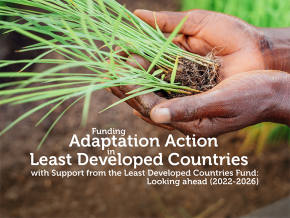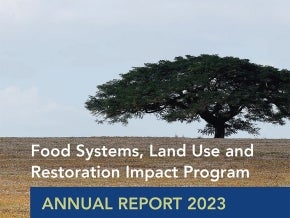
- The circular economy could be a $4.5 trillion business opportunity.
- Only 9% of the global economy is circular at present.
- The Platform for Accelerating the Circular Economy is helping to speed this transition.
As policy-makers worldwide respond to a rising tide of climate activism and extreme weather events, the concept of the circular economy has become a key lever in the climate action tool kit.
Around 50% of the world’s current greenhouse gas emissions result from the extraction and processing of natural resources, with demand for raw materials under a ‘business-as-usual’ scenario predicted to double by 2050. Indeed, the general public is increasingly interested in the concept and its importance in preserving life on Earth. As we enter the decade to deliver on the UN Sustainable Development Goals (SDGs) and climate action, there is an emerging consensus that circular economy solutions are critical to achieving those goals by the 2030 deadline. Business-as-usual is not an option.
Fortunately, businesses are increasingly recognizing the value of going circular – a global growth opportunity valued by Accenture at $4.5 trillion over the next decade. CEOs are receiving detailed shareholder questions regarding their circular strategies, specialized private investment funds are being launched dedicated to circular companies, and public-private partnerships are being established to catalyze circular government and private-sector strategies.
We urgently need to translate this awareness into action. The latest Circularity Gap report from Circle Economy reveals that, faced with the twin headwinds of increased CO2 emissions and increased resource extraction, the global economy is only 8.6% circular. Just two years ago it was 9.1%. The global circularity gap is therefore widening. This is a major concern because of the pressure that natural resource extraction could exert on biodiversity loss, ecosystem collapse, large-scale involuntary migration, and failure of climate change mitigation and adaptation, as detailed in the latest World Economic Forum Global Risks Report.
With less than 10 years to prevent global warming from exceeding 1.5˚C and only 10 years to achieve the UN Sustainable Development Goals (SDGs), it is critical to bring together leaders across industry, government, and civil society to shift the global economy more aggressively toward circularity. The Platform for Accelerating the Circular Economy (PACE) has grown quickly and has emerged as an important action hub and engine for change. With more than 70 leaders and 20 communities from across the public and private sectors, PACE has become the place to ensure that good words turn into positive actions at scale.
At the beginning of 2019, PACE moved from its place of inception (The World Economic Forum) to a new host, the World Resources Institute (WRI) in the Hague, allowing it to build out its work into a well-resourced hub. It organizes its strategic activities around four key thematic areas where the circular economy has the greatest potential – electronics and capital equipment, plastics, fashion and textiles, and food and agriculture. PACE has also established a dedicated workstream that addresses cross-cutting system challenges that can unlock scale, including meaningful metrics, business models, innovation (such as the World Economic Forum's Scale 360 initiative), and regional networks (such as the African Circular Economy Alliance and Latin American & Caribbean Circular Economy Coalition).
In working with international organizations, including the World Business Council for Sustainable Development (WBCSD) and the Ellen McArthur Foundation, PACE is underscoring the importance of moving towards a common set of metrics to accurately measure global progress towards the circular economy. While these initiatives focus on company metrics, PACE supports Circle Economy’s annual Circularity Gap report as a key measure of global and regional progress.
The need for strengthened metrics and natural resource targets to accelerate innovation and more effectively track progress towards a circular economy is emphasized in a joint paper from the International Resource Panel, the World Economic Forum, and PACE published earlier this year.
Based on insights from the PACE community and relevant external stakeholders, we have defined the key topics to focus on within the four strategic themes outlined above with the aim of scaling PACE’s global impact. For 2020, we are driving forward a number of key initiatives, including the following:
- The PACE Capital Equipment Coalition will publish a new learning document, including a new transparent reporting mechanism, to help scale up equipment take-back and recycling/repurposing programmes. The Coalition is also looking to expand by adding a new group of companies based out of North America.
- PACE will continue to build on its 2019 work and establish a blended finance Producer Responsibility Organisation (PRO) to handle e-waste in Nigeria as part of an extended producer responsibility (EPR) system, funded in part by the Global Environment Facility (GEF) through the United Nations Environment Programme. Testing this system will allow PACE to scale up EPR systems in other countries across the African continent, achieving scale and impact.
- In alignment with PACE’s affiliate initiative, the Global Plastic Action Partnership, national and municipal action plans will be created through funding from the GEF, multilateral development bank investment, and bilateral government support.
Join in and scale up. Make business-as-usual a thing of the past.
None of this will happen without people – thought leaders, business leaders, politicians, policy-makers, innovators, entrepreneurs, and NGO staff with the vision, commitment, and determination to make sure we use the world’s natural resources in sustainable and climate-friendly ways. PACE is already a formidable force for change, but we urgently need to harmonize existing efforts and scale up best-practice circular economy solutions to make a truly global impact. We encourage you to join PACE in replacing the business-as-usual model that threatens our very existence on the planet with circular solutions that offer real hope and prosperity for the future.
This piece was originally published by the World Economic Forum for the 2020 Annual Meeting.


